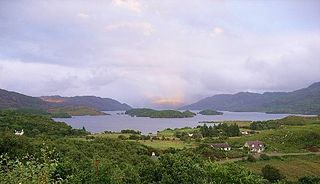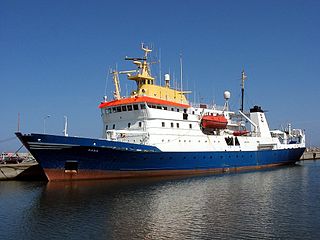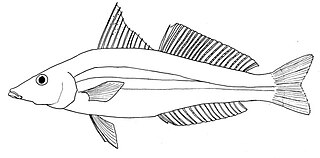
Loch Morar is a freshwater loch in Lochaber, Highland, Scotland. It is the fifth-largest loch by surface area in Scotland, at 26.7 km2 (10.3 sq mi), and the deepest freshwater body in the British Isles with a maximum depth of 310 m (1,017 ft). The loch was created by glacial action around 10,000 years ago, and has a surface elevation of 9 metres (30 ft) above sea level. It separates the traditional district of North Morar, from Arisaig and Moidart.

Fisheries science is the academic discipline of managing and understanding fisheries. It is a multidisciplinary science, which draws on the disciplines of limnology, oceanography, freshwater biology, marine biology, meteorology, conservation, ecology, population dynamics, economics, statistics, decision analysis, management, and many others in an attempt to provide an integrated picture of fisheries. In some cases new disciplines have emerged, as in the case of bioeconomics and fisheries law. Because fisheries science is such an all-encompassing field, fisheries scientists often use methods from a broad array of academic disciplines. Over the most recent several decades, there have been declines in fish stocks (populations) in many regions along with increasing concern about the impact of intensive fishing on marine and freshwater biodiversity.

The Portuguese dogfish or Portuguese shark, is a species of sleeper shark of the family Somniosidae. This globally distributed species has been reported down to a depth of 3,675 m (12,057 ft), making it the deepest-living shark known. It inhabits lower continental slopes and abyssal plains, usually staying near the bottom. Stocky and dark brown in color, the Portuguese dogfish can be distinguished from similar-looking species by the small spines in front of its dorsal fins. Its dermal denticles are also unusual, resembling the scales of a bony fish. This species typically reaches 0.9–1 m (3.0–3.3 ft) in length; sharks in the Mediterranean Sea are much smaller and have distinct depth and food preferences.

The fishing industry in Scotland comprises a significant proportion of the United Kingdom fishing industry. A recent inquiry by the Royal Society of Edinburgh found fishing to be of much greater social, economic and cultural importance to Scotland than it is relative to the rest of the UK. Scotland has just 8.4 per cent of the UK population but lands at its ports over 60 per cent of the total catch in the UK.

The golden lined whiting, also known as the Tin Can Bay whiting or rough-scale whiting, is a species of inshore marine fish of the smelt whiting family, Sillaginidae that inhabits the coastlines of northern Australia and lower Papua New Guinea. The golden lined whiting can be more readily distinguished by its colour than other whitings in the genus Sillago, although swim bladder morphology and spine and ray counts are the most precise method of identification. S. analis is an opportunistic predator, taking a variety of crustaceans, polychaetes and molluscs, with a transition of diet seen as the fish mature. One unusual aspect about the species diet is the large amounts of molluscan siphons it takes. The species spawns between January and March, with juvenile fish inhabiting the shallow protected coastal waters. Golden lined whiting is important to fisheries centered on Shark Bay in Western Australia and also in Queensland, although makes up a relatively minor component of the whiting fishery.
Carl Walters is an American-born Canadian biologist known for his work involving fisheries stock assessments, the adaptive management concept, and ecosystem modeling. Walters has been a professor of Zoology and Fisheries at the University of British Columbia since 1969. He is one of the main developers of the ecological modelling software Ecopath. His most recent work focuses on how to adjust human behaviors in environments that are full of uncertainty. He is a recent recipient of the Volvo Environment Prize (2006). In 2019, Dr. Walters became a Member of the Order of British Columbia.
Tony J Pitcher is a fisheries scientist, well known for his work on the impacts of fishing, the management appraisal of fisheries, and how shoaling behaviour impacts fisheries.
Mac Fisheries was a branded United Kingdom retail chain of fishmongers, founded by William Lever, 1st Viscount Leverhulme, the co-founder with his brother of Lever Brothers, which later merged to become Unilever.
Raymond (Ray) John Heaphy Beverton CBE FRS was an important founder of fisheries science. He is best known for the book On the Dynamics of Exploited Fish Populations (1957) which he wrote with Sidney Holt. The book is a cornerstone of modern fisheries science and remains much used today. Beverton's life and achievements are described in detail in several obituaries written by prominent figures in fisheries science.
John Reynolds is a Canadian ecologist and holder of the Tom Buell BC Leadership Chair in Salmon Conservation and Management at Simon Fraser University. He is a specialist in fish ecology and conservation, particularly Pacific salmon in the Great Bear Rainforest, as well on extinction risk in marine fishes. He is Co-Chair of marine fish committee of the COSEWIC.

Steven J. Cooke is a Canadian biologist specializing in ecology and conservation physiology of fish. He is best known for his integrative work on fish physiology, behaviour, ecology, and human-dimensions to understand and solve complex environmental problems. He currently is a Canada Research Professor in Environmental Science and Biology at Carleton University and the Editor-in-Chief of the scientific journal Conservation Physiology.
John Dow Fisher Gilchrist (1866–1926) was a Scottish ichthyologist, who established ichthyology as a scientific discipline in South Africa. He was instrumental in the development of marine biology in South Africa and of a scientifically based local fishing industry.
Felicity Anne Huntingford FRSE is an aquatic ecologist known for her work in fish behaviour.
Robert Montgomery McDowall was one of New Zealand's most prominent freshwater ichthyologists.

The FSBI Medal is an international fish biology and/or fisheries science prize awarded annually for exceptional advances by a scientist in the earlier stages of his or her career. Medallists have made a significant contribution to the field of fish biology through their achievements in scientific research. The medal is only awarded if a candidate of sufficient quality is nominated. The medal was established by the Fisheries Society of the British Isles (FSBI) to recognize distinction in the field of fish biology and fisheries science, and to raise the profile of the discipline and of the Society in the wider scientific community. Medals are awarded to individuals who have made an outstanding contribution to fish biology and/or fisheries. The FSBI Medal is traditionally awarded in July at the Fisheries Society of the British Isles Annual International Conference.
The Fisheries Society of the British Isles is an international, non-political, learned society, based in the United Kingdom, that supports scientific activity in fish biology and management through charitable sponsorship. Membership is open to anyone interested in these objectives. There have been eleven Presidents of the FSBI since its foundation including Ray Beverton FRS and Felicity Huntingford FRSE.
Alwyne (Wyn) Wheeler was a British ichthyologist who was a curator at the Natural History Museum in London. He was educated at St Egbert's College, Chingford, and Chingford County High School to Higher School Certificate level, and was unusual in that his subsequent scientific career was achieved despite his never having obtained a university degree.
The World Council of Fisheries Societies is a non-profit, non-governmental organisation intended to promote international cooperation in fisheries science, conservation and management. The Council consists of 10 member organisations, and arose from the 1st World Fisheries Congress in Athens, Greece in 1992.
The American Fisheries Society, is the "world’s oldest and largest organization dedicated to strengthening the fisheries profession, advancing fisheries science, and conserving fisheries resources." It is a member-driven 501(c)(3) nonprofit organization governed by an executive director, a governing board, and officers who are guided by the AFS's organizational documents, a constitution, and a set of rules. Their stated mission is "to improve the conservation and sustainability of fishery resources and aquatic ecosystems by advancing fisheries and aquatic science and promoting the development of fisheries professionals." AFS publishes five peer-reviewed fish journals, books, and the magazine Fisheries, organizes seminars and workshops that promote scientific research and fisheries management, and encourages fisheries education through 58 university-based student subunits. AFS has 48 chapters comprising four geographic regions in North America — North Central, Northeastern, Southern, and Western — and includes two "bi‐national" chapters and a Mexico chapter.

The Beverton Medal is a prestigious. international fish biology and/or fisheries science prize awarded annually. It is awarded to a distinguished scientist for a lifelong contribution to all aspects of the study of fish biology and/or fisheries science, with a focus on ground-breaking research. The medal was established as the highest award of the Fisheries Society of the British Isles (FSBI) to recognize distinction in the field of fish biology and fisheries science, to raise the profile of the discipline and of the Society in the wider scientific community. Medals are awarded to individuals who have made an outstanding contribution to fish biology and/or fisheries. The Beverton Medal is traditionally awarded in July at the Fisheries Society of the British Isles annual international conference.







